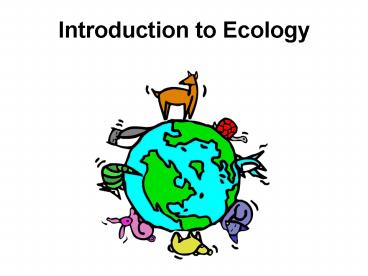Introduction to Ecology - PowerPoint PPT Presentation
1 / 26
Title:
Introduction to Ecology
Description:
Introduction to Ecology Introduction to Ecology Ecology is the scientific study of interactions among organisms and between organisms and their environment. – PowerPoint PPT presentation
Number of Views:262
Avg rating:3.0/5.0
Title: Introduction to Ecology
1
Introduction to Ecology
2
Introduction to Ecology
- Ecology is the scientific study of interactions
among organisms and between organisms and their
environment.
3
Levels of Organization
4
Levels of Organization
- Organism A complete living unit which make up a
- Species A group of organisms so similar to one
another that they can breed and produce viable
offspring. - This is the same level of organization.
5
Levels of Organization
- Population All members of a single species in an
ecosystem.
6
Levels of Organization
- Community All the populations of different
species in an ecosystem.
7
Levels of Organization
- Ecosystem A collection of all the organisms that
live in a particular place, together with their
nonliving (Abiotic), environment.
8
Levels of Organization
- Biomes A group of ecosystems that have the same
climate and similar dominant communities. - These are usually classified according to the
predominant vegetation.
Also, fresh water and marine biomes
9
Levels of Organization
- The biosphere contains the combined portion of
the planet in which ALL life exists (all
ecosystems). - This includes all
- Land
- Water
- Air (atmosphere)
10
Levels of Organization
- The biosphere extends about 8 km above the
Earths surface and as far as 11 km below the
surface of the ocean.
11
Ecological Methods
- Ecologist use a wide range of tools and
techniques to study the living world. - Binoculars
- Field guides
- Soil/Water Test kits
- Etc..
12
Ecological Methods
- Regardless of the tools they use, scientists
conduct modern ecological research using three
basic approaches.
13
Ecological Methods
- Observing This is usually the first step in
asking ecological questions? - Most questions are simple
- What species live here?
- How many individuals of each species are there?
14
Ecological Methods
- Observations (cont.)
- Many observations can lead to more complex
questions and may form the first step in
designing experiments and models. - What is the effects do humans have on the
environment?
15
Ecological Methods
- Experimenting Experiments can be used to test
hypotheses. - May use artificial environments in a lab.
- Other experiments are conduct in the natural
ecosystem.
16
Ecological Methods
- Modeling Many ecological phenomena occur over
long periods of time and on very large scales
which make them difficult to study. - Example Global Warming
- Most models consist of mathematical formulas
based on data collected through observation and
experimentation. - Predictions made by ecological modeling are often
tested by further observations.
17
Quiz Questions
- You have 15 20 minutes to study for a quiz
based on the following questions - List the six levels of ecological organization,
in order, from smallest to largest. - Define each of the six levels of organization.
- Suppose you wanted to know if the water in the
Carson River is safe to drink. Which ecological
method(s) would you choose and why?
18
Question 1
- Define Organism.
19
Question 2
- Define Biome
20
Question 3
- Define Population
21
Question 4
- Define Ecosystem
22
Question 5
- Define Biosphere
23
Question 6
- Define Community
24
Question 7
- List the six levels of ecological organization,
in order, from smallest to largest.
25
Answers
- Organism A complete living unit which make up a
species - Biome A group of ecosystems that have the same
climate and similar dominant communities. - Population All members of a single species in an
ecosystem. - Ecosystem A collection of all the organisms that
live in a particular place, together with their
nonliving (Abiotic), environment. - Biosphere The biosphere contains the combined
portion of the planet in which ALL life exists
(all ecosystems). - Community All the populations of different
species in an ecosystem.
26
Answers
- 7.































